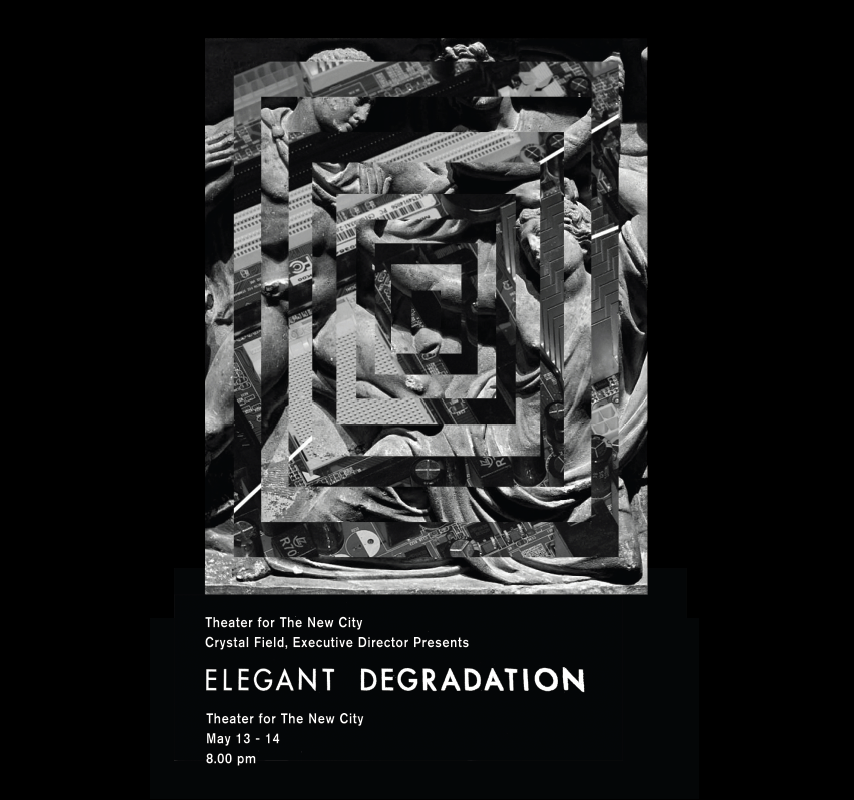In playwright Chuck Mee’s Orestes 2.0, which premiered in 1992, Mee adapted the greek tragedy to a modernized interpretation, bringing themes of universal violence and generational gaps to light in a new lens. Elegant Degradation, The New School’s newest performance art piece, is revamping Chuck Mee’s version on Tuesday May 13th, and adding the stamp of the “millennials” to the myth. The term “elegant degradation” is used in engineering to describe the state of a machine being subjected to repeated stress, that can remain superficially functional in its appearance, while being slowly corrupted from within.
One can recognize this concept most visibly in politics, but it also extends directly to contexts such as the human condition and gender. In Elegant Degradation, Helen of Troy is presented as as a competent and beautiful woman. Meanwhile, she has been traded and wars have been fought over her, imprinting a sense of internal dissolve and depression in her character, when on the surface she looks flawless and whole. The original characters from the Greek myth are all the same, and the writing is in certain ways still reminiscent of Euripides, but the cultural setting is heavily steeped in the 21st century.

In Chuck Mee’s Orestes, there is the idea that violence is always present and is always being felt on some level, no matter how spatially detached one is from it. In Euripides’ Orestes, this manifested as the Trojan War, which the characters are not in close proximity with, but they can’t seem to shake its curse either. In Elegant Degradation, the wars in Iraq and Afghanistan have a similar effect on Americans, and we feel distanced from it when atrocities are committed across the world.
Speaking about this disillusionment, Elegant Degradation’s Sarah Halford told The Free Press, “This is really true for our generation because all the wars fought by our country are overseas. [The violence] doesn’t directly affect us, but there is the question of, what are the underlying negative effects?”
With the elegant degradation concept, the façade hiding internal decay is something that can often repeat itself throughout history in different forms with each generation. “We call [the façade] something else, so in the play they call it ‘the curse of the House of Atreus,’ but it’s really a curse of history, or a curse of human nature,” said Sophie Kaufman, who plays Electra, Orestes’ sister.
The show is rife with props of technology from the 2000s era (including iPhones and references to social media), as well as various multimedia including video, visual art, and a score to accompany the scenes. Rather than having the dialogue escalate into singing as narration, like a musical does, the score will act to set the tone of the scenes similar to the way a film score operates. The generational gaps and cyclicity are themes the creators of Elegant Degradation are examining in the key points of their play, as well as in the larger context of theater itself, and its current state within the culture of 2014.
They feel that some aspects of current theater cater to the tastes and expectations of an older generation. They hope that their play could be a sort of “reset button” for this crop of theater, so that plays could be driven more by their themes and less by routinized plot devices and overt cues for the audience.
“Actions like making theater like this help to get people to really come to consciousness and be aware of issues,” said Halford. “We have so many themes in this, but the overall thing that we’re trying to accomplish is to wake the audience up.”
The play is up May 13-14 at the Theater For New City. More information can be found at their Facebook page: http://www.facebook.com/elegantdegradation.
Linus is a Literary Studies major at Lang. He enjoys seeing dope music shows and cooking dope ass meals in his spare time. He hails from Seattle, WA and left there to get away from the perpetual grey weather and become a full time New Yorker instead. He plans to write fiction as a career (knock on wood) and travel a lot.







